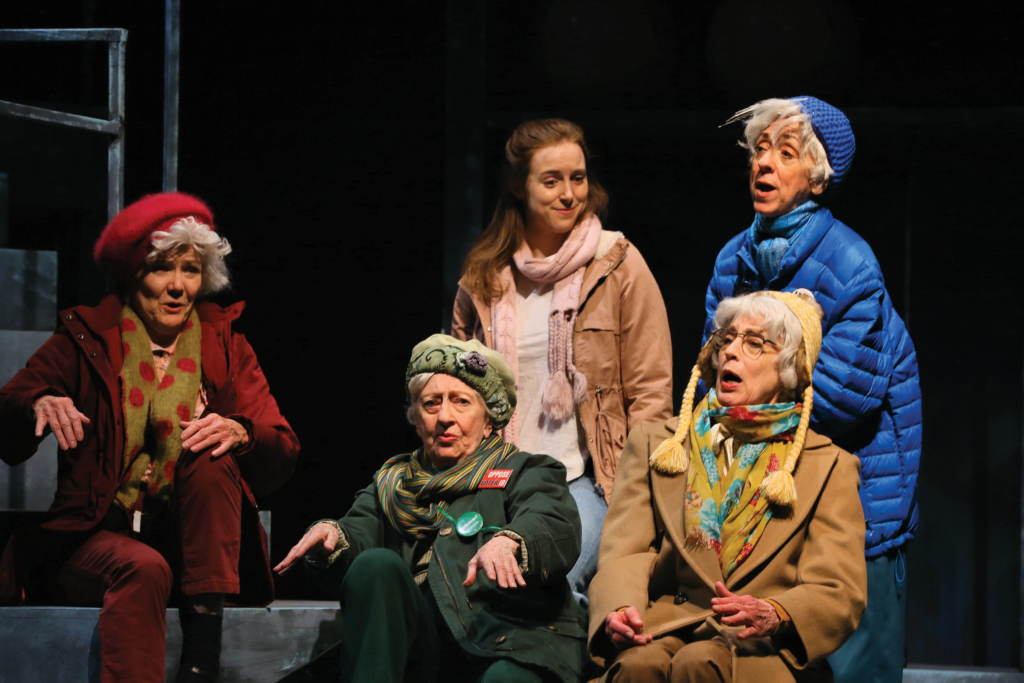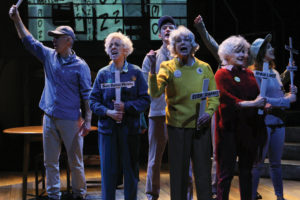Facilitator and Actor Annick Dall on Her Role in “Sisters of Peace” and the Benefits of Theater for Students
May 21, 2019
In March and April 2019, Project Success had the opportunity to bring students to History Theatre’s Sisters of Peace, thanks to tickets generously donated by the theater. This was a particularly unique opportunity as Project Success Facilitator Annick Dall (South High School) had a role in the show, acting in a number of different ensemble parts, including portraying younger versions of the four main characters. During the run of the show, Annick was also facilitating discussions in her high school workshops about its themes, bringing in her own life experience to build connections with students. Below, Communications Manager Amy Stubblefield Barthel and Annick talk about the many unique opportunities performing and facilitating offered to her and her students.

Q: In your words, what is the History Theatre’s Sisters of Peace about?
It’s a story about the lives of four real sisters. They’re four of 11 children of the McDonald family and all are nuns. All became nuns at the same convent in St. Paul, and throughout their lives, each of them was drawn to activism and the peace movement in different ways. The story is about all of the ways that activism affected their lives, their relationship with their church, and their family. It spans from 1945 to present day, but is not necessarily told chronologically; it’s a tapestry of what has led them to fight for the things they fight for.
They became activists around the time of the Vietnam War, and all four sisters are still alive. The youngest sister is Jane, who is 86 now. We had a lot of opportunities to meet them and talk with them during rehearsal and during the show as well.
Jane worked in the cafeteria at Holy Angels in Minneapolis around that time. She heard an activist speaking about the economic impact of the war and became really concerned about it. It was this calling unlike anything she’d felt before.
They were active during Vietnam. They were active during Desert Storm. Every Wednesday for probably the last 20 years or so, even the Wednesday after 9/11, they have done a vigil on the Lake Street bridge. They’ve also done a lot for LBGT rights in the Catholic Church. All of them have been arrested multiple times for civil disobedience.
Q: What about the themes of the show made it relatable and important for students to see, in your opinion?
These are real people who are members of our community. I actually had a few students who personally know them and when I was talking to them about it, they said “I know them! They’ve known me since I was a baby!”
There are so many themes in the show that relate to what we tell students. It’s about following what is true to you, and sticking to it, no matter what anyone else says. We do a workshop about values and during that workshop, I showed two different pictures of the four sisters without telling the students who they were. One photo was when they were young, they’re all in their full habits at home on their farm, sitting on a little fence. The second was of the four of them many years later. They’re older, in their everyday wear, holding signs that say “Women Against Military Madness.”
I showed the two pictures and asked the class “What values do you think these people have?”
We talked about what values we can see for the picture of these four nuns, and what values can we see from the picture of these four women. Then I said “Well, it’s actually the same women in both pictures. How do you think it’s possible to have both of these values happening at the same time? Do you see anywhere where they would have been in conflict?” For the sisters,their values were in conflict at times. It was a great jumping off point for that type of discussion.
They talk about the fact that there is a lot they don’t necessarily agree with that the church does, but there is a line in the show where they say, “Well, what if we love it enough to change it?”
Q: Did you integrate any of your personal experience in the show into your workshops? How did those two worlds collide for you?
Yes, absolutely. In workshops, we are always bringing our personal life experience into what we’re doing, because that’s usually the thing that really lights a fire in somebody’s imagination — when you can tell a story.
We were doing mindfulness workshops around the time that I was in rehearsal, and so we talked a lot about “What does mindfulness look like? Is it always about being calm and still and meditative and really thoughtful? Are there ways where you can be mindful and very active and moving quickly?” For example, we talked about sports or playing an instrument. I said, “Right now, I’m in a show, and I play 8 or 9 different characters. I have 7 or 8 costume changes. I have to be very mindful and aware and awake to everything that I’m doing and every moment because I could forget to put on a costume, I could trip and fall, I could hurt someone, I could get us all out of the story.”
It’s funny because I’ve talked about my background acting and how I went to school for it. I’ve been able to show my students my own journey in this job and in acting. That’s been cool thing for some of my 11th graders, who have known me since they were in 9th grade. I’ve been able to tell them, “I’m in this show, and this is something that I want to commit to even more.” It feels great to be able to show them that your experience can take you anywhere.

Q: Tell me about the characters you play.
I was playing each one of the sisters in flashbacks. So, age 12 to age 21, at different points in their life. It was meant to show the importance of the emotional journey of the sisters. These were moments when the oldest sister would see herself as a younger person, and sometimes they’d talk to each other and interact and have this scene where she’d reflect: “Wow, I’ve really changed. Oh, that used to be me. I’m so thankful that I am where I am now.”
In workshops, I’d talk about that. I would say, “Imagine if you met yourself when you were in 6th grade. What would you have to say to that person and how have you changed since then?” And that’s what’s happening in this show four times over.
Q: What was the audition process like? Was it at all like the journey we help guide students through?
Honestly, if I hadn’t gotten the part, it was worth it just going to that audition. I hadn’t done it in years. If I could’ve talked to my younger self I’d have said, “You are gonna be so much better at this when you’re 28.” When I was 23 or 24, I was so scared. I didn’t have the same confidence. This time I was able to say, “I’m so happy I’m dressed the way I am, I’m not wearing heels, I didn’t curl my hair. I am me and confident in the choices I’m making going in.” That in itself was enough of a win.
Q: What were student reactions to the show?
I actually had the chance to talk to some students who knew the sisters in real life. Something that stuck out to me from the show, and when talking to any of the students who know the sisters, is love. That is one of our core values at Project Success too, but it’s all about love; that is all there is for them. And talking to the sisters, you feel it pouring out from them, and it’s so powerful.
Q: What do you personally love the most about performing?
It’s that empathy and imagination peace. To get to “try on” the life of someone else. It doesn’t feel like escape, it just feels like being a bit of a detective: “Oh, what if I was this person, and this happened to me? Or what if I was a person who believed this, or thought that? What is that like?” And it changes the way you move around the world. It changes the way you relate to other people in the world, too.
On those nights when I would feel tired — I came back from the Chicago college tour and had a matinee at 1 o’clock the next day. I was like, “You know what though? This is a gift to be able to do this.”
Q: Bringing both your “facilitator hat” and your “performer hat” to this question, why is it important for students to experience theater?
There are so many reasons! I think it is important for us to see other people’s experiences, even if they are fictional people. In the case of this show, these are real people. To see what others have gone through in their life tells you you’re not alone, it tells you that there’s more than your experience and your world. It’s a magical thing and I really believe in the power of imagination to change the way that people treat each other and treat themselves. And that was why I wanted to work at Project Success to begin with, because of the fact that we use theater to teach these really great social and emotional learning skills.
For students who participate in theater, or anything that’s creative, it’s something that you are doing for the sake of doing it. It’s not something you’re doing to win. It’s not something you’re doing to get a grade. It’s a process and it’s about responding to the world. And so any student who’s involved in anything creative, even just by being an audience member or a viewer, it elevates your perception.
Being able to imagine what someone else is going through, that is empathy. If we had more of that we would have more of all good things. We’d have more respect, we’d have more understanding, hopefully, we’d have more peace.


